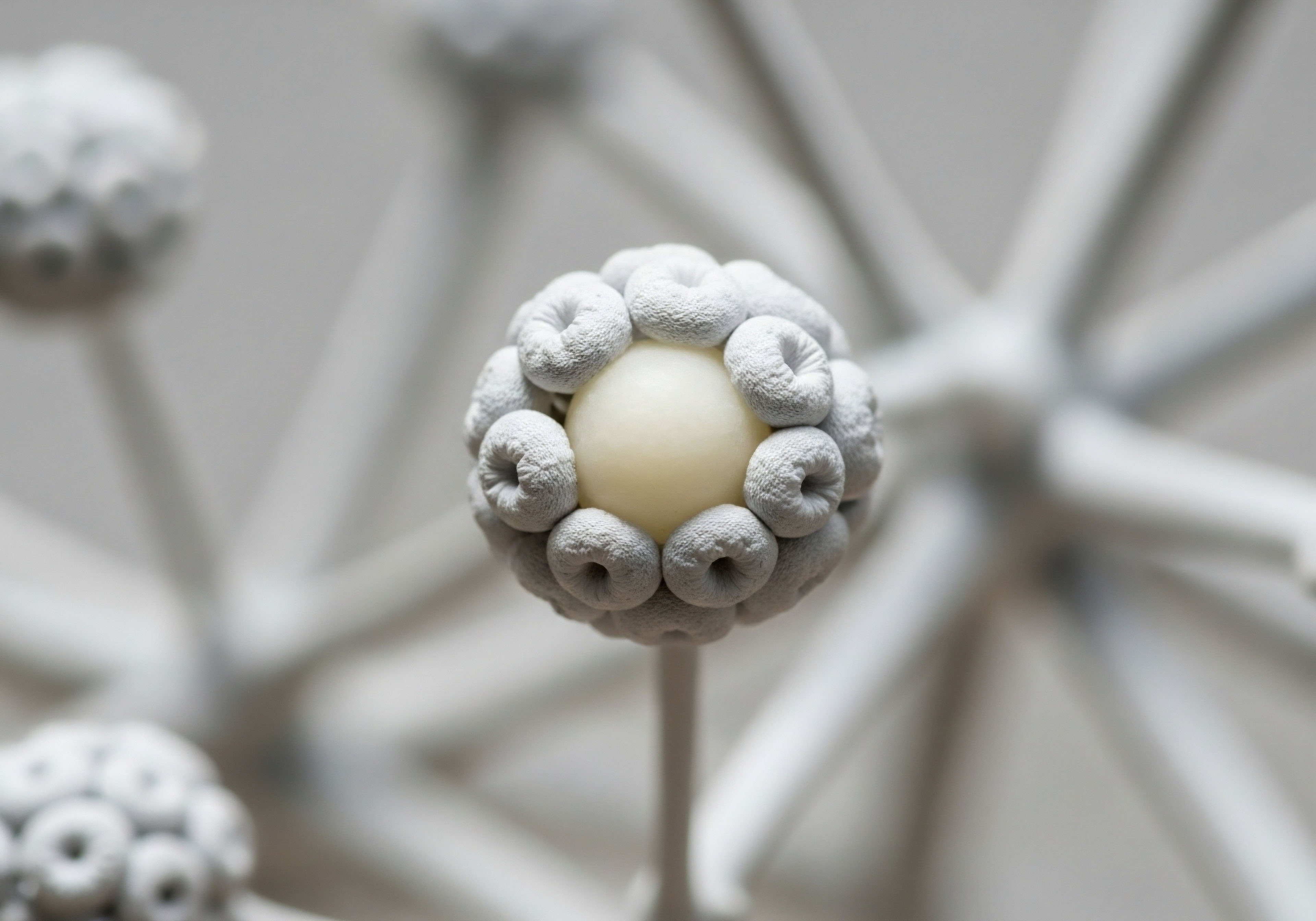

Fundamentals
Many individuals experience a subtle yet persistent shift in their overall well-being, a feeling that something is simply “off.” This might manifest as a persistent mental fog, a quiet erosion of motivation, or a diminished capacity for joy that seems to defy simple explanation.
You might find yourself grappling with a sense of disconnection from your former self, observing changes in your cognitive sharpness or emotional resilience. These experiences are not merely subjective sensations; they often represent profound shifts within your biological systems, particularly your endocrine architecture. Understanding these internal changes is the first step toward reclaiming your vitality and cognitive clarity.
Testosterone, often mistakenly categorized as exclusively a male hormone, plays a vital and often underestimated role in female physiology. Produced in smaller but significant quantities by the ovaries and adrenal glands, this androgen is a fundamental component of a woman’s hormonal landscape. Its influence extends far beyond reproductive functions, impacting diverse bodily systems.
Optimal testosterone levels contribute to the maintenance of lean muscle mass, support bone density, and regulate energy levels throughout the day. Beyond these physical attributes, testosterone is a critical mediator of mental clarity, emotional stability, and a healthy sense of drive.
When testosterone levels decline in women, a range of symptoms can arise, signaling an imbalance within the endocrine system. These indicators frequently include persistent fatigue, a pervasive lack of energy that resists rest, and noticeable shifts in mood, such as increased irritability or a predisposition to low spirits.
Cognitive difficulties, including challenges with memory recall, reduced attention span, and a general “brain fog,” are also commonly reported. A diminished libido, or a decrease in sexual desire, is another significant symptom that can affect personal well-being and relationships. Recognizing these signs is paramount for timely intervention and restoring hormonal equilibrium.
Testosterone is a vital hormone for women, influencing physical health, mood, and cognitive function.
The hypothalamic-pituitary-gonadal (HPG) axis , a complex communication network, orchestrates the production and regulation of sex hormones throughout the body. This intricate system involves the hypothalamus in the brain, which releases gonadotropin-releasing hormone (GnRH), signaling the pituitary gland to produce luteinizing hormone (LH) and follicle-stimulating hormone (FSH). These gonadotropins, in turn, stimulate the ovaries to produce estrogen, progesterone, and testosterone. This continuous feedback loop ensures hormonal balance, influencing everything from reproductive cycles to cognitive processes.
Within the brain, specific regions are highly responsive to testosterone, possessing specialized androgen receptors. These receptors are found in areas critical for cognitive function and emotional regulation, including the hippocampus, which is essential for memory formation, and the prefrontal cortex, involved in executive functions like decision-making and planning.
The limbic system, a collection of brain structures involved in emotion, motivation, and memory, also exhibits a significant presence of these receptors. This widespread distribution underscores testosterone’s direct influence on neural pathways that govern mental acuity and emotional state.
Understanding the foundational role of testosterone in female physiology, and its direct impact on brain health, provides a clearer lens through which to view seemingly disparate symptoms. It allows for a more targeted and effective approach to wellness, moving beyond symptom management to address the underlying biochemical realities. This perspective empowers individuals to engage actively in their health journey, equipped with knowledge about their body’s sophisticated internal messaging system.


Intermediate
Addressing hormonal imbalances requires a precise and personalized approach, particularly when considering testosterone optimization for female brain health. Clinical protocols are designed to restore physiological levels of testosterone, aiming to alleviate symptoms and enhance overall well-being. These strategies often involve the careful administration of specific therapeutic agents, tailored to an individual’s unique hormonal profile and health objectives. The goal is to recalibrate the endocrine system, supporting its innate capacity for balance and optimal function.

What Clinical Protocols Support Female Testosterone Optimization?
For women experiencing symptoms of low testosterone, Testosterone Replacement Therapy (TRT) is a key component of hormonal optimization protocols. A common approach involves the use of Testosterone Cypionate , administered via subcutaneous injection. Typical dosages range from 10 to 20 units (0.1 ∞ 0.2 ml) weekly, ensuring a steady and controlled release of the hormone into the system.
This method allows for precise titration, meaning the dosage can be adjusted incrementally to achieve optimal physiological levels while minimizing potential side effects. The aim is to mimic the body’s natural production patterns, providing a consistent hormonal signal to various tissues, including the brain.
Alongside testosterone, Progesterone plays a complementary role, especially for pre-menopausal, peri-menopausal, and post-menopausal women. Its inclusion in a hormonal optimization protocol is determined by an individual’s menopausal status and specific needs. Progesterone contributes to overall hormonal harmony, supporting mood regulation, sleep quality, and uterine health.
For some, Pellet Therapy offers a long-acting alternative for testosterone delivery. These small pellets, inserted subcutaneously, provide a sustained release of testosterone over several months, reducing the frequency of administration. When appropriate, Anastrozole , an aromatase inhibitor, may be prescribed to prevent the conversion of testosterone into estrogen, particularly if estrogen levels become excessively high, which can lead to undesirable effects. This comprehensive approach considers the interconnectedness of female sex hormones, striving for a balanced endocrine environment.
Personalized testosterone therapy for women involves precise dosing and often includes other hormones like progesterone for comprehensive balance.
The benefits of optimizing testosterone extend beyond the direct effects of the hormone itself, often involving a synergistic interplay with other biochemical recalibrations. For instance, the impact on mood and cognitive symptoms has been observed in clinical settings. A study involving 510 peri- and postmenopausal women reported significant improvements in both mood and cognitive function following transdermal testosterone therapy.
While mood improvements were more pronounced, with 47% of women reporting betterment, cognitive improvements were also noted in 39% of participants. This suggests a broad influence on neuropsychological well-being, supporting the notion that testosterone has benefits beyond libido.
Beyond direct hormonal therapy, Growth Hormone Peptide Therapy offers another avenue for systemic recalibration, indirectly supporting brain health through broader physiological improvements. Peptides such as Sermorelin , Ipamorelin / CJC-1295 , Tesamorelin , Hexarelin , and MK-677 function as growth hormone secretagogues. They stimulate the pituitary gland to produce and release human growth hormone (HGH), which is vital for cellular growth, repair, and metabolism throughout life.
The benefits associated with these peptides are diverse, contributing to an environment conducive to optimal brain function ∞
- Increased Lean Muscle Mass ∞ Supports overall physical health and metabolic efficiency.
- Reduced Body Fat ∞ Contributes to better metabolic health, which positively impacts brain function.
- Improved Sleep Quality ∞ Essential for cognitive restoration and memory consolidation.
- Enhanced Concentration and Mental Acuity ∞ Direct and indirect benefits on cognitive performance.
- Accelerated Recovery and Healing ∞ Supports the body’s repair mechanisms, reducing systemic burden.
For example, Sermorelin mimics the action of growth hormone-releasing hormone (GHRH), prompting the pituitary to release HGH in a natural, pulsatile manner. CJC-1295 with Ipamorelin provides a sustained release of HGH, leading to enhanced muscle mass, fat burning, and tissue repair. These peptides work by engaging with specific receptors in the pituitary gland, triggering the release of growth hormone and insulin-like growth factor 1 (IGF-1), both of which are critical for cellular health and neurological support.

What Other Targeted Peptides Support Overall Well-Being?
In addition to growth hormone-stimulating peptides, other targeted peptides address specific aspects of well-being that can indirectly influence brain health. PT-141 , also known as Bremelanotide, is a peptide specifically designed for sexual health. It acts directly on the central nervous system, stimulating melanocortin receptors in the brain to enhance sexual desire and arousal.
This unique mechanism makes it a valuable option for women experiencing hypoactive sexual desire disorder (HSDD), a condition that can significantly impact mood and overall quality of life. By addressing this often-overlooked aspect of health, PT-141 contributes to a more holistic sense of well-being, which inherently supports mental and emotional balance.
Another significant peptide is Pentadeca Arginate (PDA) , a synthetic form of Body Protection Compound 157 (BPC-157). This peptide is recognized for its remarkable properties in tissue repair, healing, and inflammation reduction. PDA promotes collagen synthesis, a vital process for rebuilding injured tissues, and has demonstrated efficacy in accelerating the healing of tendons, ligaments, and other soft tissues. Its anti-inflammatory actions help mitigate discomfort and support faster recovery from injuries.
Beyond its musculoskeletal benefits, Pentadeca Arginate also offers potential neurological advantages. It influences the brain-gut axis , a bidirectional communication system between the central nervous system and the enteric nervous system. This influence can potentially aid in mood regulation and cognitive function, highlighting the systemic impact of this peptide. By reducing systemic inflammation and supporting cellular repair, PDA creates a more stable internal environment, which is conducive to optimal brain performance.
The integration of these diverse protocols, from precise testosterone optimization to targeted peptide therapies, reflects a comprehensive understanding of the body’s interconnected systems. Each intervention is selected to address specific physiological needs, contributing to a broader strategy for restoring balance and enhancing overall vitality, including the intricate functions of the brain.


Academic
The intricate relationship between testosterone and female brain health extends to the deepest levels of neurobiology, influencing cellular function, neurotransmitter dynamics, and structural integrity. A comprehensive understanding of these mechanisms reveals why optimizing testosterone can yield significant benefits for cognitive performance and emotional resilience. This exploration moves beyond surface-level observations to dissect the molecular and cellular underpinnings of hormonal action within the central nervous system.

How Does Testosterone Influence Neurobiological Mechanisms?
Testosterone exerts its influence through the widespread presence of androgen receptors (ARs) throughout the brain. These receptors are found in critical regions such as the hippocampus, a structure fundamental for learning and memory, and the prefrontal cortex, which governs executive functions like decision-making, working memory, and attention.
The binding of testosterone to these receptors initiates a cascade of intracellular events, leading to changes in gene expression and protein synthesis that directly impact neuronal function and survival. This direct interaction highlights testosterone’s role as a neurosteroid, capable of modulating brain activity at a fundamental level.
Beyond direct receptor activation, testosterone significantly modulates neurotransmitter systems , which are the brain’s chemical messengers. It influences the regulation of serotonin, a neurotransmitter associated with mood stability and well-being; dopamine, linked to motivation, reward, and executive function; and norepinephrine, involved in alertness and stress response.
By fine-tuning the activity of these crucial neurotransmitters, testosterone contributes to improved mood, reduced anxiety, and enhanced cognitive processing. For instance, balanced testosterone levels can mitigate the effects of cortisol, the stress hormone, promoting a calmer and more resilient mental state. This intricate interplay underscores how hormonal equilibrium translates into tangible improvements in mental and emotional health.
Testosterone acts as a neuroprotective agent, supporting neuronal health and cognitive function through various brain mechanisms.
A key aspect of testosterone’s benefit to the brain is its neuroprotective capacity. Testosterone exhibits potent antioxidant properties, neutralizing reactive oxygen species (ROS) that can cause cellular damage and contribute to neurodegenerative processes. It also possesses anti-inflammatory effects, reducing the production of pro-inflammatory cytokines that drive neuroinflammation, a significant factor in cognitive decline.
Furthermore, testosterone has been shown to have anti-apoptotic potential, meaning it helps prevent programmed cell death in neurons, thereby preserving neural integrity. This multifaceted protective action contributes to neuronal survival and resilience against various insults, including those associated with aging and metabolic dysfunction.
Testosterone also supports synaptic plasticity , the ability of synapses, the connections between neurons, to strengthen or weaken over time in response to increases or decreases in their activity. This adaptability is fundamental for learning and memory formation. Studies have demonstrated that testosterone can enhance verbal learning and memory in postmenopausal women, suggesting a direct role in cognitive processes.
The hormone’s influence on neurogenesis , the creation of new neurons, particularly in the hippocampus, is another area of active research, pointing to its potential in maintaining cognitive vitality throughout life.

How Do Hormones and Metabolic Health Intersect for Brain Function?
The brain is a highly metabolically active organ, and its function is intimately linked to systemic metabolic health. Hormonal balance, including optimal testosterone levels, plays a significant role in maintaining metabolic homeostasis, which in turn supports brain health.
Testosterone influences insulin sensitivity and glucose metabolism. In women, while the relationship can be complex and dose-dependent, physiological levels of testosterone are associated with improved insulin sensitivity and reduced visceral adiposity, particularly in postmenopausal women. Better insulin sensitivity means cells, including brain cells, can more efficiently utilize glucose for energy, supporting optimal neuronal function.
Dysregulation of glucose metabolism, often seen in conditions like insulin resistance and type 2 diabetes, is a known risk factor for cognitive decline and neurodegenerative diseases. By contributing to healthy metabolic parameters, testosterone indirectly safeguards brain health.
The anti-inflammatory and antioxidant properties of testosterone are particularly relevant in the context of neuroinflammation and oxidative stress , which are implicated in the pathogenesis of various neurological disorders. Chronic low-grade inflammation and oxidative damage can impair neuronal function, disrupt synaptic connections, and contribute to the progression of conditions like Alzheimer’s disease. By mitigating these detrimental processes, testosterone acts as a systemic modulator, creating a more favorable environment for brain health.
Genetic factors can also modify the impact of testosterone on brain health. For example, research indicates that the effects of testosterone on cognitive function in women may be moderated by apolipoprotein E ε4 allele (APOE-ε4) carrier status. This genetic variant is a known risk factor for Alzheimer’s disease.
Studies suggest that lower testosterone levels may contribute to worse Alzheimer’s disease outcomes in women, especially for those with higher genetic risk. This highlights the importance of considering individual genetic predispositions when assessing hormonal interventions for brain health.
Current clinical evidence, while growing, still points to areas requiring further investigation. While studies have shown specific benefits, such as improvements in verbal learning and memory, and mood and cognitive symptoms in real-world cohorts , a global consensus statement from 2019 noted insufficient evidence to support the use of testosterone solely for enhancing cognitive performance or delaying cognitive decline in postmenopausal women.
This underscores the need for more adequately powered, long-term randomized controlled trials with cognitive and mood outcomes as primary measures. Despite these research gaps, the mechanistic understanding of testosterone’s neurobiological actions provides a compelling rationale for its role in supporting female brain health, prompting continued clinical exploration and personalized therapeutic strategies.
| Mechanism | Description | Impact on Brain Health |
|---|---|---|
| Androgen Receptor Activation | Testosterone binds to specific receptors in neurons, particularly in the hippocampus and prefrontal cortex. | Direct modulation of gene expression, influencing neuronal survival and function. |
| Neurotransmitter Modulation | Influences levels and activity of serotonin, dopamine, and norepinephrine. | Improved mood, motivation, cognitive processing, and reduced anxiety. |
| Neuroprotection | Exhibits antioxidant, anti-inflammatory, and anti-apoptotic properties. | Protects neurons from damage, reduces neuroinflammation, and preserves neural integrity. |
| Synaptic Plasticity | Supports the brain’s ability to strengthen or weaken neuronal connections. | Enhances learning, memory formation, and cognitive adaptability. |
| Peptide Category | Examples | Primary Mechanism | Brain-Related Benefits |
|---|---|---|---|
| Growth Hormone Secretagogues | Sermorelin, Ipamorelin/CJC-1295, Tesamorelin, Hexarelin, MK-677 | Stimulate pituitary to release HGH and IGF-1. | Improved sleep, mental acuity, concentration, and overall cellular health supporting brain function. |
| Sexual Health Peptides | PT-141 (Bremelanotide) | Activates melanocortin receptors in the brain’s central nervous system. | Enhanced sexual desire and arousal, contributing to improved mood and well-being. |
| Tissue Repair & Anti-inflammatory Peptides | Pentadeca Arginate (PDA) | Promotes collagen synthesis, reduces inflammation, influences brain-gut axis. | Indirect support for cognitive function and mood regulation by reducing systemic inflammation and supporting gut-brain communication. |

References
- Shah, S. M. Bell, R. J. Savage, G. Goldstat, R. Papalia, M. A. Kulkarni, J. & Davis, S. R. (2006). Testosterone aromatization and cognition in women ∞ a randomized placebo controlled trial. Menopause, 13(4), 600-608.
- Davison, S. L. Bell, R. J. Gavrilescu, M. Searle, K. Maruff, P. Gogos, A. & Davis, S. R. (2011). Testosterone improves verbal learning and memory in postmenopausal women ∞ Results from a pilot study. Maturitas, 70(3), 307-311.
- Glynne, S. & Newson, L. (2025). Effect of transdermal testosterone therapy on mood and cognitive symptoms in peri- and postmenopausal women ∞ a pilot study. Archives of Women’s Mental Health, 28(3), 541-550.
- Watts, N. B. & Miller, K. K. (2019). Global Consensus Position Statement on the Use of Testosterone Therapy for Women. The Journal of Clinical Endocrinology & Metabolism, 104(10), 4307-4317.
- Vadakkadath Meethal, S. & Atwood, C. S. (2005). The role of hypothalamic-pituitary-gonadal hormones in the normal structure and functioning of the brain. Cell and Molecular Life Sciences, 62(3), 257-270.
- Davis, S. R. (2023). Research Excellence ∞ trialling women’s testosterone therapy. NHMRC.
- Rosario, E. R. Chang, L. Head, E. H. Stanczyk, F. Z. & Pike, C. J. (2011). Brain levels of sex steroid hormones in men and women during normal aging and in Alzheimer’s disease. Neurobiology of Aging, 32(4), 604-613.
- Hogervorst, E. Williams, J. Budge, M. Riedel, W. & Jolles, J. (2000). The nature of the effect of female gonadal hormone replacement therapy on cognitive function in post-menopausal women ∞ a meta-analysis. Neuroscience, 101(3), 485-512.
- Gao, Y. Liu, Y. Li, X. & Zhang, Y. (2021). The association between serum testosterone levels and metabolic syndrome among women. Lipids in Health and Disease, 20(1), 1-10.
- Traish, A. M. & Guay, A. T. (2024). Metabolic benefits afforded by estradiol and testosterone in both sexes ∞ clinical considerations. Journal of Clinical Investigation, 134(17).
- Vukojević, J. Staresinic, M. & Sikirić, P. (2020). Pentadecapeptide BPC 157 and its synthetic form, pentadeca arginate, play a major role in supporting tissue repair, decreasing inflammation, and promoting recovery from various conditions and injuries. Medical Anti-Aging.
- Sikirić, P. C. Seiwerth, S. & Sikiric, P. (2010). Pentadecapeptide BPC 157 ∞ a new molecule with an old story. Current Pharmaceutical Design, 16(10), 1222-1232.

Reflection

Your Personal Hormonal Blueprint
The journey toward understanding your hormonal health is a deeply personal one, a continuous process of self-discovery and recalibration. The information presented here serves as a guide, offering a scientifically grounded perspective on the profound influence of testosterone on female brain health. It is a starting point, a framework for comprehending the intricate biological systems that govern your vitality and cognitive function. Each individual’s hormonal blueprint is unique, shaped by genetics, lifestyle, and environmental factors.
Consider this knowledge not as a definitive endpoint, but as a powerful tool for introspection. How do these insights resonate with your own lived experiences? What subtle shifts in mood, energy, or cognitive clarity have you observed? These personal observations, when combined with clinical understanding, form the foundation for a truly personalized wellness path.
Reclaiming your optimal function is not about chasing an idealized state; it is about aligning your internal biology with your desired quality of life. This alignment requires attentive listening to your body’s signals and a proactive engagement with evidence-based strategies.

The Path to Reclaimed Vitality
The path to reclaimed vitality is not a one-size-fits-all solution. It demands a partnership with knowledgeable clinical professionals who can translate complex scientific data into actionable protocols tailored specifically for you. This collaborative approach ensures that any hormonal optimization, whether through testosterone therapy or peptide support, is precisely calibrated to your unique physiological needs.
The goal is to support your body’s inherent capacity for balance, allowing you to experience sustained well-being and cognitive sharpness without compromise. Your health journey is an ongoing dialogue between your body’s wisdom and scientific understanding, leading you toward a future of empowered health.



